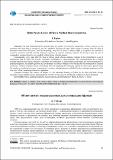Files in this item
Sixty years later : Africa’s stalled decolonization
Item metadata
| dc.contributor.author | Taylor, Ian | |
| dc.date.accessioned | 2020-04-02T14:30:14Z | |
| dc.date.available | 2020-04-02T14:30:14Z | |
| dc.date.issued | 2020-03-30 | |
| dc.identifier | 267159672 | |
| dc.identifier | 78de32f8-c451-4fe4-b7cd-53a5f47153c0 | |
| dc.identifier | 85110507645 | |
| dc.identifier.citation | Taylor , I 2020 , ' Sixty years later : Africa’s stalled decolonization ' , Vestnik RUDN: International Relations , vol. 20 , no. 1 , pp. 39-53 . https://doi.org/10.22363/2313-0660-2020-20-1-39-53 | en |
| dc.identifier.issn | 2313-0660 | |
| dc.identifier.other | RIS: urn:72F852D386805AE5EC4A584F08FED7D8 | |
| dc.identifier.uri | https://hdl.handle.net/10023/19745 | |
| dc.description.abstract | The year 1960 marked the moment when the number of nominally independent African countries on the continent rose from nine to twenty-six and is a symbolic indicator of when Africa began to emerge from the days of European colonization. However, from the beginning, very few of Africa’s leaders sought to reorganize the continent’s economic structures and did virtually nothing to question its external exchange relations. Preferring to play the role of compradors, most preferred to stay wedded to their former colonial masters. Consequently, sixty years after the Year of Africa, most African countries continue to be entrenched in a set of connections that fit well with Kwame Nkrumah’s description of neocolonialism. This neocolonialism has a highly resilient material base which continues to maintain the continent in its subordinate global status and which perpetuates its underdevelopment. Sustainable growth and development in Africa continues to be blocked by the domination of external economies. African countries remain constrained from accumulating the necessary capital for auto-centric growth since the surplus is transferred overseas. Asymmetrical economic relationships are embodied by the continued supremacy of the core over Africa, something intrinsic to capitalism. Unequal exchange, the transfer of surplus i.e. the continued looting of Africa by its elites and their foreign associates, means that the dreams and aspirations of 1960, for the majority of Africans at least, have been frustrated. | |
| dc.format.extent | 15 | |
| dc.format.extent | 489076 | |
| dc.language.iso | eng | |
| dc.relation.ispartof | Vestnik RUDN: International Relations | en |
| dc.rights | Copyright © Taylor I., 2020. This work is licensed under a Creative Commons Attribution 4.0 International License. https://creativecommons.org/licenses/by/4.0/ | en |
| dc.subject | Africa | en |
| dc.subject | Underdevelopment | en |
| dc.subject | Neocolonialism | en |
| dc.subject | Decolonization | en |
| dc.subject | P. Baran | en |
| dc.subject | K. Marx | en |
| dc.subject | V. Lenin | en |
| dc.subject | JZ International relations | en |
| dc.subject | T-NDAS | en |
| dc.subject | SDG 8 - Decent Work and Economic Growth | en |
| dc.subject.lcc | JZ | en |
| dc.title | Sixty years later : Africa’s stalled decolonization | en |
| dc.type | Journal article | en |
| dc.contributor.institution | University of St Andrews.School of International Relations | en |
| dc.identifier.doi | 10.22363/2313-0660-2020-20-1-39-53 | |
| dc.description.status | Peer reviewed | en |
This item appears in the following Collection(s)
Items in the St Andrews Research Repository are protected by copyright, with all rights reserved, unless otherwise indicated.

